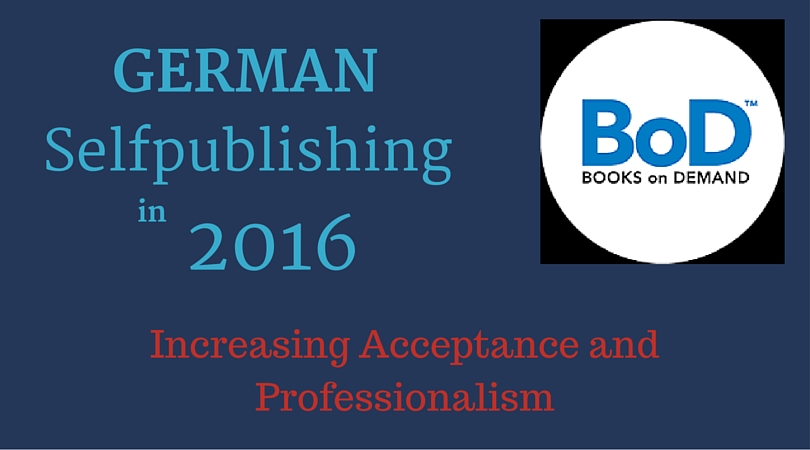Selfpublishing in Germany – Increased Acceptance and Professionalism in 2016 Study
When I was at the Leipzig Book Fair the other week (17-20 March 2016), I felt that selfpublishing has truly ‘arrived’ in Germany. A large area was dedicated to selfpublishing with Amazon, BoD (Books on Demand), Tolino, Epubli, etc. being represented, as well as a full program of informative talks for selfpublished authors and those aspiring to be –all of it situated right next to the traditional publishers’ booths. There was also a booth of the “Lieblingsautoren” (‘favorite authors’), a group of successful selfpublishers who’ve come together to set up their own presence at the fair, to meet fans and promote their books.
In time for the exhibition, BoD (Books on Demand), Germany’s leading selfpublishing service platform (especially for print books) presented the results of its new study on the growth and potential of selfpublishing in Germany and Europe. With more than 5,000 authors interviewed as well as readers and booksellers, this was the biggest study so far and it provided some interesting data that I wanted to share. Some results are similar to the selfpublishing survey 2015 that I covered in another blog post last year.
How authors view selfpublishing:
1) Why German authors choose selfpublishing: 90% do so because they want to have full control over their content, rights, and marketing. For more than 35% gaining a higher income plays an important role in their decision-making. These numbers have grown significantly since 2013, showing the increasing awareness and professionalism of selfpublishers in Germany.
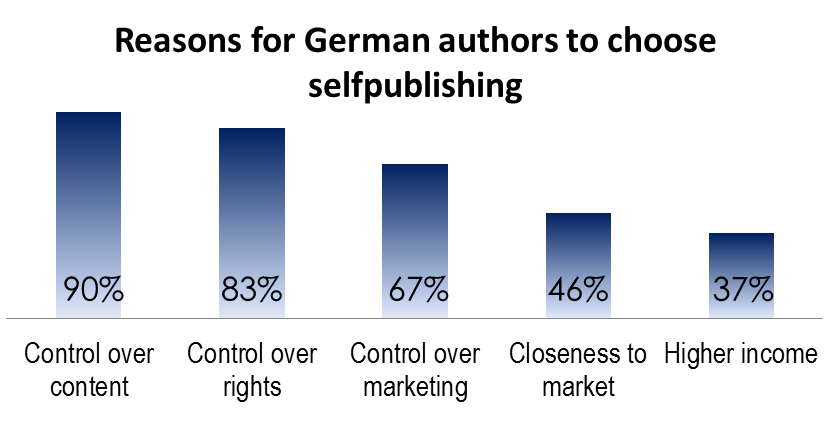 2) 51% of German selfpublishers consider their writing part of their business (12% are full-time authors and 39% “expert authors” whose books are side products of their business), while 49% write only for their own enjoyment.
2) 51% of German selfpublishers consider their writing part of their business (12% are full-time authors and 39% “expert authors” whose books are side products of their business), while 49% write only for their own enjoyment.
3) Of those 12% who consider writing their chief occupation and income source:
- write on average about 15 h per week
- spend 4 h per week on marketing
- have published on average 9 titles in selfpublishing and 5 in traditional publishing.
- 50% of them work together with service providers: 74% pay for editing, 71% for cover design, 70% for proofreading, which underlines the increasing professionalism
4) Surprisingly (to me), the ebook seems to be by no means the preferred or only medium for selfpublished authors in Germany. The majority of 73% publish both ebooks and print, 22% only print, and only 5% only ebooks. That amounts to 95% of all German selfpublishers who also offer their books in print format.
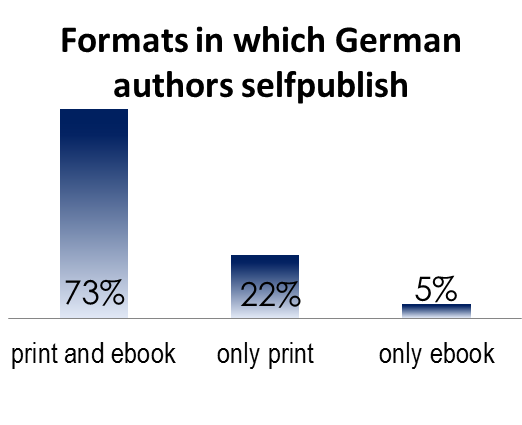 5) Distribution channels selfpublishers in Germany use are online stores (88%), book stores (53%), but also direct sales from their own websites (45%). On third use ebook subscription models which brings them ahead of the traditional publishers.
5) Distribution channels selfpublishers in Germany use are online stores (88%), book stores (53%), but also direct sales from their own websites (45%). On third use ebook subscription models which brings them ahead of the traditional publishers.
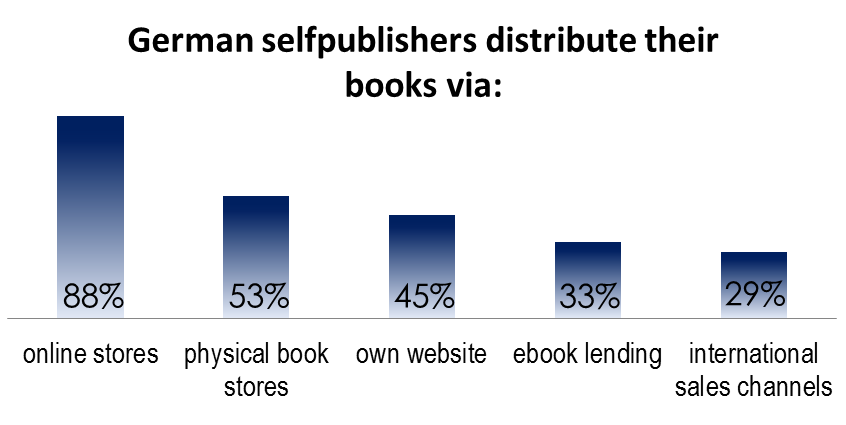 6) 46% of selfpublished authors contact local book stores to stock their books, and 77% of the contacted stores agree to do so. However, it’s likely that print books produced via Create Space are not accepted by most German book store owners. Other PoD service providers like BoD itself will be the better choice for those who plan to approach physical book stores.
6) 46% of selfpublished authors contact local book stores to stock their books, and 77% of the contacted stores agree to do so. However, it’s likely that print books produced via Create Space are not accepted by most German book store owners. Other PoD service providers like BoD itself will be the better choice for those who plan to approach physical book stores.
What readers think of selfpublishing:
1) The majority (87%) of surveyed readers knew of selfpublishing; 78% of those have already read a selfpublished title, and most of them (86%) have had positive experiences with it.
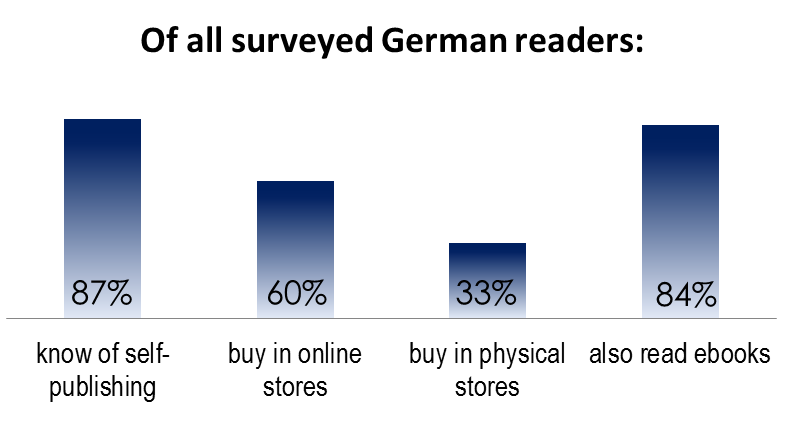 2) Compared to the numbers in the graph above, 86% of readers buy selfpublished titles in online book stores, and only 9% from physical stores, which isn’t surprising. But it’s interesting to note that 30% of readers buy directly from the author. Half of the readers prefers to read selfpublished titles in ebook format, while 18% read only print.
2) Compared to the numbers in the graph above, 86% of readers buy selfpublished titles in online book stores, and only 9% from physical stores, which isn’t surprising. But it’s interesting to note that 30% of readers buy directly from the author. Half of the readers prefers to read selfpublished titles in ebook format, while 18% read only print.
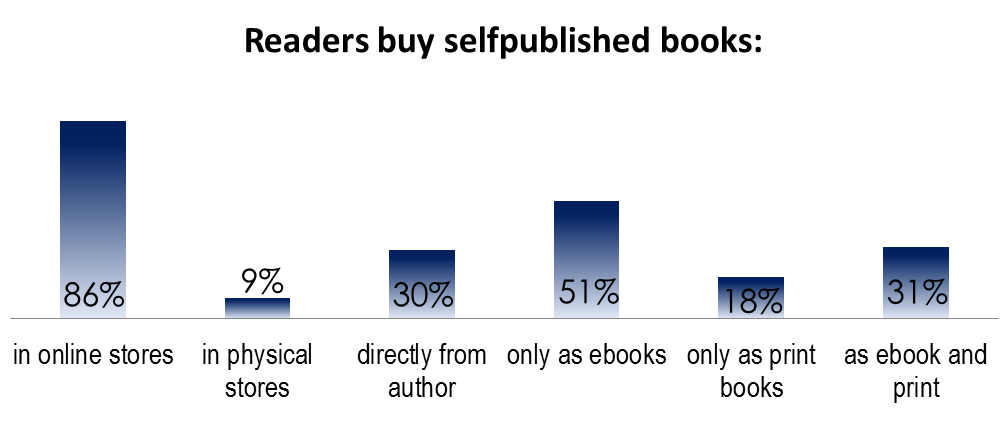 3) The most important factors that guide buying decision by German readers: For most, first impressions are the most important: 92% base their decision on the book description, 73% judge a book by its cover. 70% are guided by the price. Reader reviews are seen as important by 58% of people, while book reviews on blogs or in traditional media play a lesser role. It’s encouraging to see that only 9% of readers are interested in the publisher when they decide to buy a book.
3) The most important factors that guide buying decision by German readers: For most, first impressions are the most important: 92% base their decision on the book description, 73% judge a book by its cover. 70% are guided by the price. Reader reviews are seen as important by 58% of people, while book reviews on blogs or in traditional media play a lesser role. It’s encouraging to see that only 9% of readers are interested in the publisher when they decide to buy a book.
 In addition to the average data above, there appear to be two groups of readers: The “digital crowd” (46%) who read mostly ebooks. For them, price and reviews are more important. And the “aesthetic crowd” (54%) who buy mostly print. For them, good presentation is everything, price or reviews play a lesser role, as they mostly trust their own judgment.
In addition to the average data above, there appear to be two groups of readers: The “digital crowd” (46%) who read mostly ebooks. For them, price and reviews are more important. And the “aesthetic crowd” (54%) who buy mostly print. For them, good presentation is everything, price or reviews play a lesser role, as they mostly trust their own judgment.
How German book sellers view selfpublishing:
1) 40% of book stores get weekly requests by customers for selfpublished titles. This leads to 42% of the book sellers stocking selfpublished titles in their stores, while 12% at least plan to do so in the future. However, many book sellers (54%) will only order selfpublished books if they are available from book wholesalers, which is the case if you use services like BoD (but not with Create Space).
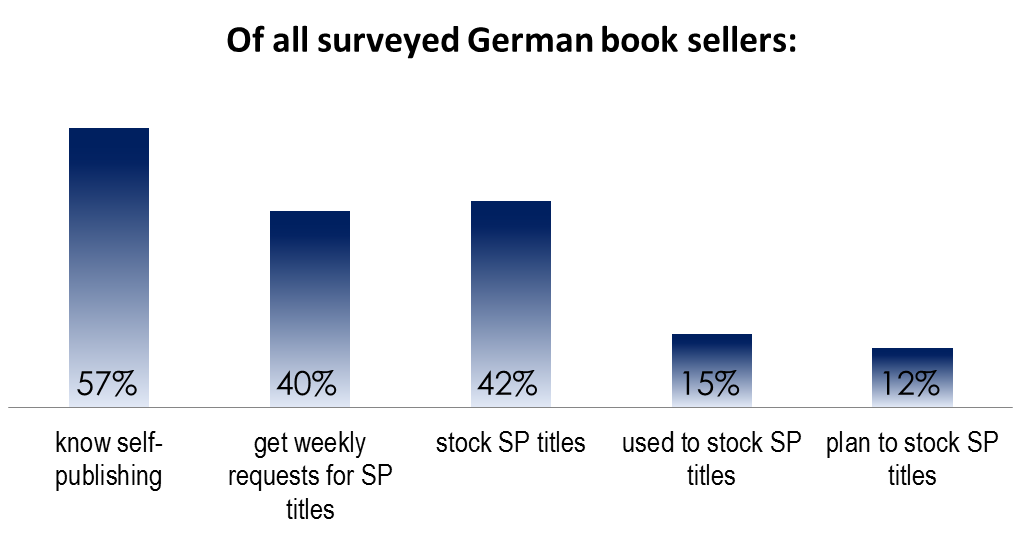 2) Book sellers see a need for improvement in the quality of selfpublished titles, both in exterior/design and content, but at least 31% think that selfpublishing will become increasingly important for traditional book stores in the future.
2) Book sellers see a need for improvement in the quality of selfpublished titles, both in exterior/design and content, but at least 31% think that selfpublishing will become increasingly important for traditional book stores in the future.
Conclusion:
Selfpublishing in Germany is “growing up” as it has in many English language markets a while ago. More authors are using professional services to increase their books’ quality. Most of the selfpublishers place value on a wide distribution, including print and ebook formats and several distribution channels. This results in increased reader awareness and positive experiences with selfpublished titles. Most readers don’t pay attention to the publisher when they decide to buy a book. Book sellers react by stocking more selfpublished titles, but only those available through book wholesalers. More and more traditional publishers contract with formerly selfpublished authors and several of them have formed their own selfpublishing platforms or ebook programs. As authors today can decide which path they want to choose with increasing confidence, we’ll probably see a rise in hybrid authors in the future.
Source: Books on Demand, “Europäische Self-Publishing-Studie 2016”, March 2016

